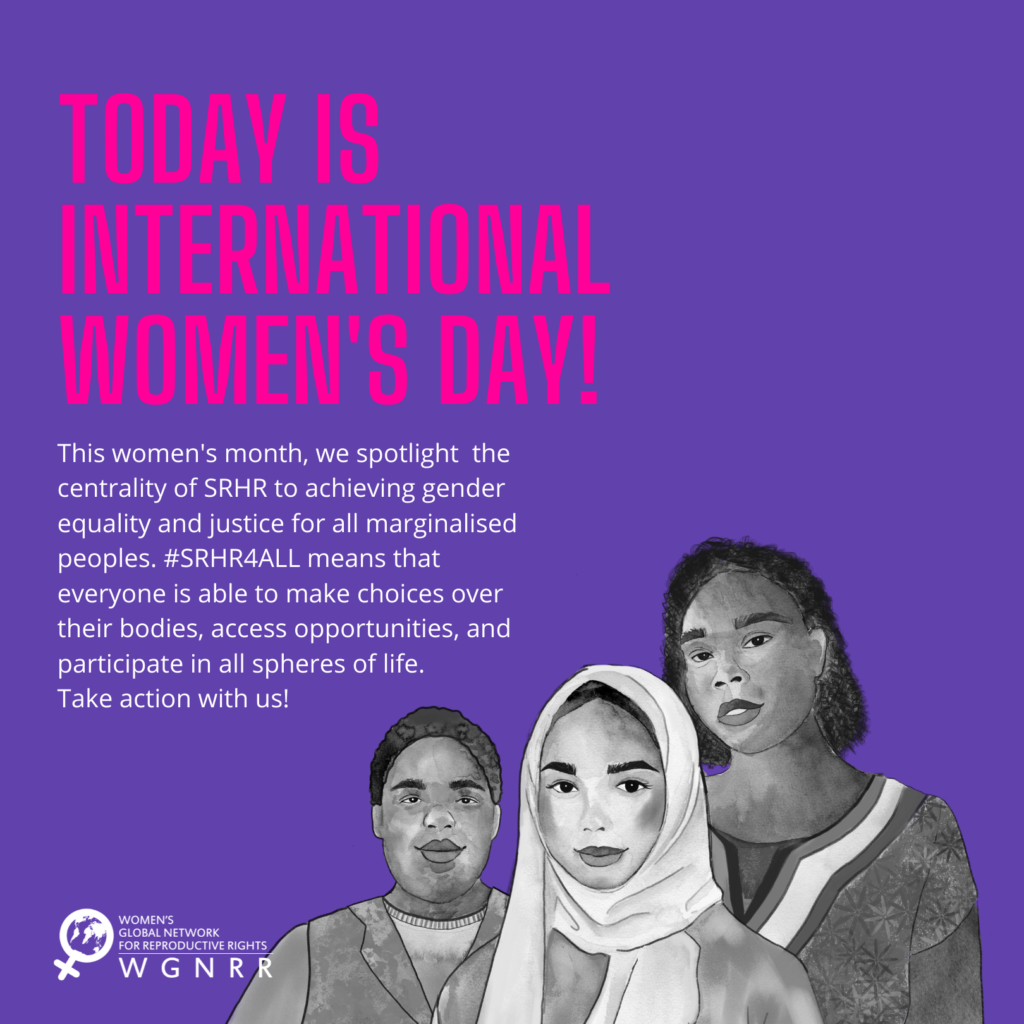SRHR activists take action this Women’s Month!

The theme for this year’s International Women’s Day and Women’s Month is “gender equality today for a sustainable tomorrow”. This emphasis on sustainability is in line with the theme of the 66th session of the Commission on the Status of Women, also happening this month: “Achieving gender equality and the empowerment of all women and girls in the context of climate change, environmental and disaster risk reduction policies and programmes”.
Indeed, gender equality and women’s empowerment must be regarded as crucial components of our response to the ongoing climate crisis. It also needs to be emphasised that climate change is here and now and is disproportionately affecting women, girls and persons of marginalised genders and sexualities the world over. For these people, climate change means loss of livelihoods, increased risk to gender-based violence, and barriers to accessing essential sexual and reproductive health services, including safe abortion and post-abortion care services.
The climate crisis now happens alongside COVID-19 pandemic which has exposed and exacerbated long-standing social and gender inequalities and introduced significant rollbacks to human rights, particularly our sexual and reproductive rights. Apart from disruption of vital SRH services, marginalised communities have also seen blatant disregard for their rights in the form of harassment, violence and lack of prioritisation when it comes to social policies and services.
It is a fraught time where the deliberate political and economic decisions of a few powerful countries and large corporations only worsen our multiple and concurrent crises, allowing vaccine shortages and severe climate events to strike vulnerable countries, particularly those in the Global South. We are also witnessing rising geopolitical tensions and ongoing conflicts in various parts of the world – Afghanistan, Ethiopia, Myanmar, Palestine, Syria, Yemen, and now Ukraine . Amid all of this, the limitations of current structures of global governance are stark.
More than ever, SRHR activists must insist on a rights-based approach and the centrality of SRHR and bodily autonomy to gender equality and women’s empowerment. Even prior to the pandemic and the worsening of the climate situation, SRHR activists have seen how lack of political commitment, conservative forces, and mass disinformation constantly threaten the achievement of SRHR, which has resulted in its deprioritisation in times of crises. We have much to bring to the table to ensure appropriate and intersectional responses to the social problems we are facing today.
This Women’s Month, the Women’s Global Network for Reproductive Rights (WGNRR) aims to spotlight the centrality of SRHR to achieving justice for marginalised peoples all over the world. #SRHR4ALL means that everyone, including those that have been and are systematically disadvantaged due to poverty, race, ethnicity, disability, and sexual orientation and gender identity and expression, and vulnerability to crises, among others, are able to make choices over their bodies, access opportunities, and participate in all spheres of life.
Focusing on pandemic, disaster and humanitarian response without an intersectional, justice, gender, and equity lens is inadequate. How the governments, especially powerful countries with resources, navigate and respond to these crises matter now, how they extend their resources to help respond to the multiple crises and inequalities being spotlighted and experienced by countries that lack resources.
In this light, we invite all SRHR activists and allies to take action and call on their governments to:
- Recognize sexual and reproductive health and rights (SRHR) as central to women’s empowerment and gender equality and commit to its achievement through legislation and implementation of policies that facilitate access to sexual and reproductive health services and information, including safe abortion and post abortion care services, and repealing of harmful policies, particularly those that criminalize women and marginalized genders for making choices over their bodies, health and lives;
- Ensure an intentional and meaningful participation of women in girls, LGBT communities, including engaging men and boys as partners, in programmes and policies related to SRHR, including humanitarian response;
- Place particular focus on the needs of marginalized communities, people of color, gender non-conforming people, and women and girls, including the indigenous women and girls living in rural and remote areas, through addressing the multiple and intersecting forms of discrimination that prevent them from realising SRHR and make them vulnerable to crises;
- Fight mass disinformation on climate change, COVID-19 and issues of gender and sexuality, and invest in research that applies an intersectional lens that links socioeconomic, health, and gender inequalities to climate change, to address the data gaps, provide evidence-based insights to strengthen policies and programs, and promote intersectional analysis;
- Address structural barriers, embedded in social norms, laws, and policies that prevent individuals from realizing their sexual and reproductive health and rights and exacerbate the climate crisis and the COVID-19 pandemic we are experiencing; and
- Denounce war of aggression, build peace, and strengthen solidarities based on rights and evidence-based policymaking at regional and global levels.
These are challenging times but we remain strong through our feminist solidarity. This solidarity will keep us vigilant, energised, reflective, accountable and nurturing of each other throughout this month and beyond.
